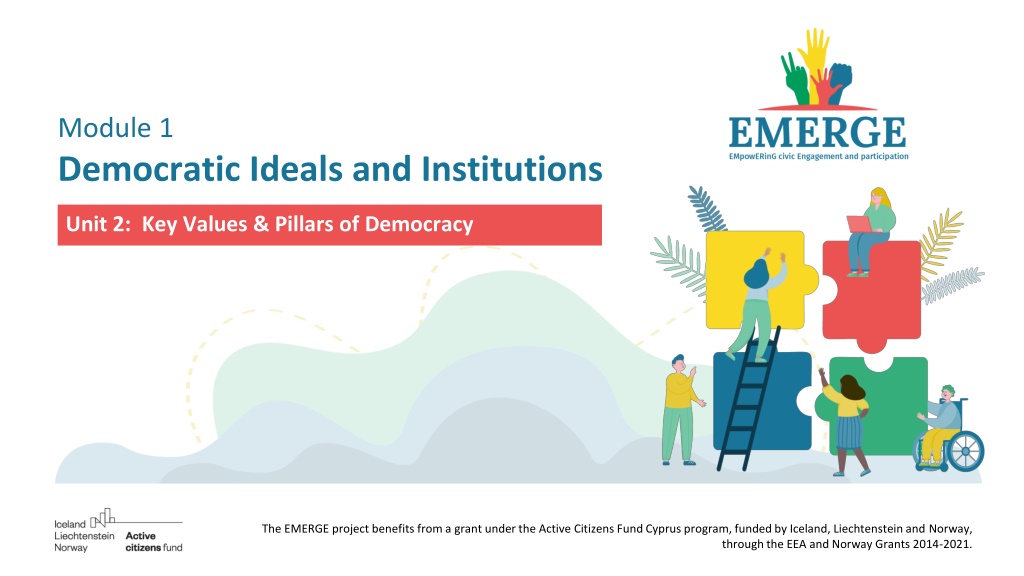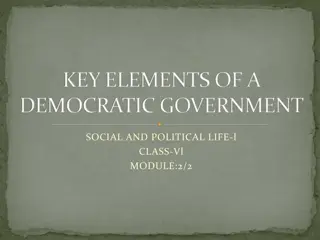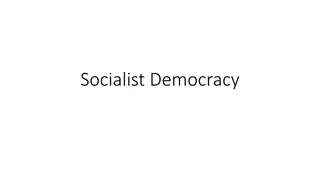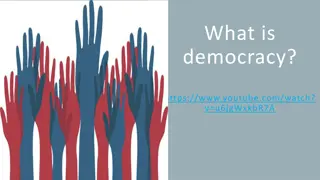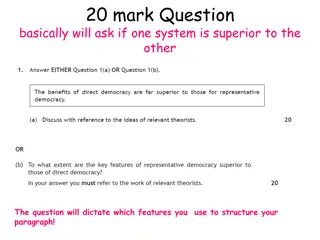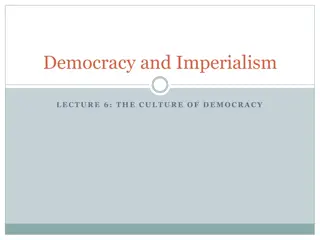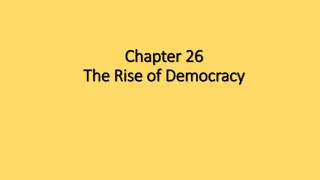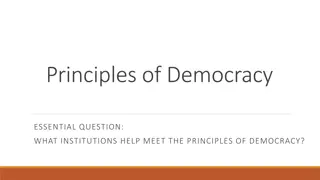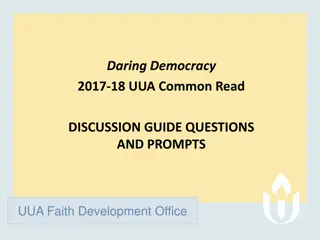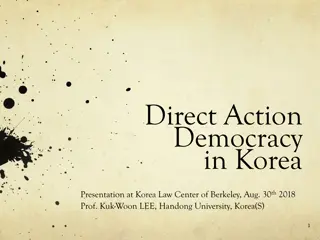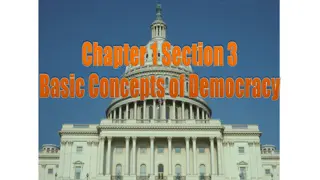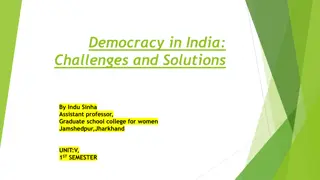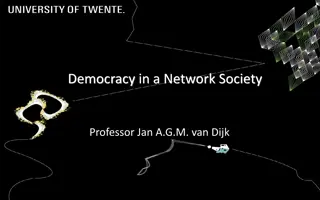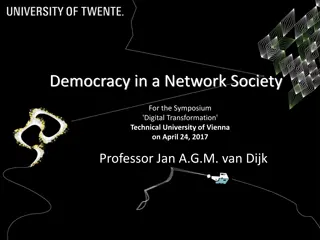Understanding the Principles of a Functioning Democracy
A functioning democracy is built on principles such as the ultimate authority of the people, essential rights like freedom of expression, adherence to human rights, and the government's legitimacy from the electorate. Principles like accountability, freedom of assembly, and the separation of powers among the three branches of government are crucial for a robust democracy.
Download Presentation

Please find below an Image/Link to download the presentation.
The content on the website is provided AS IS for your information and personal use only. It may not be sold, licensed, or shared on other websites without obtaining consent from the author. Download presentation by click this link. If you encounter any issues during the download, it is possible that the publisher has removed the file from their server.
E N D
Presentation Transcript
Module 1 Democratic Ideals and Institutions Unit 2: Key Values & Pillars of Democracy The EMERGE project benefits from a grant under the Active Citizens Fund Cyprus program, funded by Iceland, Liechtenstein and Norway, through the EEA and Norway Grants 2014-2021.
Principles of a Functioning Democracy Democracy is the collection of principles upon which the ideal that People are the ultimate authority and source of legitimacy of government is built on. Understanding Real Democracy: Reflect on what elements are essential for a true democracy. Use your laptop or mobile to search for the foundational principles of democracy. Watch the provided Video to deepen your understanding of democratic principles. These present the fundamentals and the basis on which Democratic states are built and are often being measured.
Principles of a Functioning Democracy Essential Rights in Democracy Fundamental liberties such as freedom of expression, association, movement, and security. Vital for open dialogue and resolving societal differences. Proactive Role in Democratic Societies Commitment to uphold and advance individual rights. Adherence to the Universal Declaration of Human Rights. Democratic Responsibility Upholding human rights is paramount in all state decisions and actions. This duty persists even amidst majority opposition. Guaranteeing human rights and freedoms
Principles of a Functioning Democracy Source of Legitimacy The government derives its legitimacy from the electorate's consent. This consent is expressed through fair and regular elections. Empowering Citizens Elections enable citizens to vote or run for office freely and without fear. They provide an opportunity to express opinions and select representatives. Accountability and Choice Representatives are held accountable by the electorate. Elections are the primary means for the public to express their will and exercise choice. Regular and Fair Elections
Principles of a Functioning Democracy Freedom of Expression Essential for individuals to communicate thoughts and opinions freely. A cornerstone of democratic societies. Right to Assemble Freedom to gather and advocate for shared beliefs. Enables collective action and representation. Foundation for Additional Rights These liberties are crucial for safeguarding and promoting other rights. Integral to a robust and functional democracy. Freedom of Expression & Association
Principles of a Functioning Democracy Three Branches of Government Legislative: Responsible for making laws. Executive: Implements and enforces laws. Judicial: Interprets and applies the law. Limiting Power Concentration Separation ensures no single branch holds excessive power. Checks and Balances Each branch has mechanisms to check and balance the powers of the others. Prevents abuse of power and maintains democratic integrity. Separation of powers
Principles of a Functioning Democracy Diverse Participation Methods Public debate: Facilitates informed discussion. Town meetings: Encourages local community involvement. Peaceful protests: Allows expression of collective concerns. Supporting Active Participation Citizen groups and civil society organizations play a crucial role. Their support ensures that diverse forms of participation are accessible and effective. Participation of citizens Legal and Political Responsibility Governments in a democracy are accountable to the public both legally and politically. Upholding the Law Ensures all public officials adhere strictly to legal standards. Justification of Policies Policies must be justifiable and in the public interest. Open and accountable government
Principles of a Functioning Democracy The equal treatment of all people in a democracy is essential, and discrimination based on race, religion, gender, or sexual orientation is not tolerated. Equality Government actions and outcomes are clearly visible to the public, and public information should be available upon request to the public. Transparency
Principles of a Functioning Democracy Equal Rights for All Democracy upholds equality of rights, regardless of the majority's stance. Voice of the Minority Minority groups retain the right to express and share their views. This right persists even if they are not the majority post-election. The Value of Inclusiveness Diversity of ideas and openness are vital for a thriving democracy. Suppressing minority voices can hinder societal progress and development. Political tolerance Freedom of Choice in Elections: Essential for voters to have a range of political party options. Peaceful Power Transition: In case of opposition victory, a peaceful transfer of power ensues. Fosters ongoing debates and discussions. Single-Party Rule vs. Democracy: Continuous rule by a single party can resemble a dictatorship. Some countries maintain democratic processes even with dominant party rule. Multi-party system
Principles of a Functioning Democracy Personal Choice Freedom to choose education, career, and lifestyle within legal boundaries. Government's Role Supports choices, doesn't dictate them. Economic Freedom Key to strong communities and economies. Fuels innovation and growth. Freedom of economy Protection from Power Abuse Safeguards individual freedoms against governmental overreach. Key Freedoms Includes speech, assembly, and more. Legal Integration Often enshrined in national constitutions. Legal Recourse Allows citizens to challenge rights violations in court. Bill of Rights Inevitability of Disputes Disagreements are common even in well-functioning democracies. Equal Access to Justice: An independent judiciary ensures fair dispute resolution. Judicial Independence Judges act as impartial referees, applying rules uniformly. Risks of Government Influence Court packing or ignoring judicial decisions undermines democracy. Free Courts
Principles of a Functioning Democracy Pluralism and compromise Open debates, persuasive arguments, and compromises are crucial to the democratic process, assuming that there are different opinions and interests on most policy issues. Empowering Society Grassroots voice counters arbitrary rule, limiting state authority. Requirements for Democracy Associations need both independence and internal democracy. Impact of Authoritarianism Authoritarian experiences in personal spheres hinder civic engagement. Self-organization and co-determination are key to societal responsibility. A democratic or civil society
Institutions of a Democratic System Democratic institutions are institutions that facilitate and promote the operations of democracy. What are the main Institutions of a Democratic System? What are their main functions? Please share your Ideas!! They are those institutions that make democracy to work.
Institutions Institutions Shaping Behavior: Influence motivation and actions in economic, political, and social spheres. Example: Minimum wage affecting employee and business behaviors. Institutions as Norms: Impact varies based on individual roles (citizens, consumers, business owners, etc.). Influence decision-making in voting, consumer habits, employment, and education. Institutions as Organizations: Make collective decisions influencing public policies and norms.
Institutions THE GOVERNMENT PARLIAMENT The government, with legislative initiative and Both formal rules and a multitude of executive power, plays the most important organisations are enacted through legislation, role in the process of shaping institutions and the vast majority of which are proposed by the public policy. government and established by parliament. Through its legislative initiative and Parliament can also take a legislative initiative, parliamentary majority, it can create new although it is mainly the government's institutions or change existing institutions and responsibility. In addition, parliament is organizations. responsible for voting on the budget, which is one of the main tools for conducting public policies.
Institutions: Political Parties A political party is an organized group of individuals who share same political ideologies, beliefs and interests and who are seeking to win elections and control the state power and machinery of government. Political parties serve as a forum for national unity and mutual understanding. This is possible because it brings together people from different ethnic and religious groups. Provide political education to members and general public serve as machinery for recruitment /appointment serve as a link between the people and the government ensure political stability in government allow for harmonization of sectional and diversified interest helps to sensitize the electorate on crucial national issues, governmental policies and programmes ensure that the party in power is accountable to the electorate through constructive criticism.
Institutions PUBLIC ADMINISTRATION THE JUDICIARY Public administration, or bureaucracy as it is often called, is responsible for the conduct of public policy, for the day-to-day running of public institutions and for compliance with the rules. The judiciary (the courts), through the enforcement of laws and their interpretation in the resolution of disputes, affects the functioning of the institutions. Indeed, this effect can be decisive through case law. In fact, public administration can often have a significant influence on the conduct of public policy and the functioning of institutions, to the extent that the executive does not always specify the framework for their implementation. The constitutionality of laws, and hence of the institutions, which means that the judiciary even has the power to annul those rules which are not in line with what the Constitution stipulates. power of the courts include reviewing the In addition, through the knowledge and experience of public administration officials they can contribute to the formation and change of institutions, providing advice to policy makers. The judiciary can even contribute to the formation of new rules or even organizations, highlighting cases where the legislative and regulatory framework is insufficient or non- existent. At the same time, however, they can make it difficult or in essence to cancel an institutional change when they oppose it.
Institutions INTEREST GROUPS NON-GOVERNMENTAL ORGANIZATIONS (NGOS) Interest groups, which usually have a formal organisation and institutional defining their responsibilities, can influence the process of shaping and changing institutions. framework These are non-state and non-profit organizations, usually citizens, which have a formal organization and seek to defend not the interests of their members, but individual and social rights and interests such as the population groups and the environment. Typical examples are trade unions at various levels, professional associations, associations, patient associations, employers' organizations and associations of undertakings in a branch of activity. protectionof special consumer Their influence on the processes of shaping and changing institutions arises first of all from their action to highlight and / or informally fill institutional gaps and influence policy makers and citizens to address them. The ability of interest groups to influence the formation or transformation of an institution depends on their organisation, cohesion and population. In addition, these organizations, having know-how and significant experience on the issues they deal with, also exercise an advisory role to the shapers of institutions and policy.
Institutions RESEARCH ORGANIZATIONS AND THINK TANKS MEDIA The media also influence the formation of institutions, as, among other things, they can influence the public agenda and the attitude of public opinion towards it. Research organisations and think tanks, through their research, formulate policy proposals in areas on which they focus, thus contributing to the formulation and change of institutions. In particular, the media can highlight areas in which new institutions could be created or existing ones could be changed. At the same time, through their activities they can mobilize the scientific and political elite around their policy proposals. At the same time, having the potential to influence public opinion, they may give preference to arrangements over others. They have the possibility of documenting the costs of maintaining the existing institutional regime and assessing the benefits replacement, thus influencing institutional change. certain institutional of its possible
Group Activity: Democratic Institutions in Cyprus Activity Time!! (Worksheet) Identify and list the different democratic institutions that operate in Cyprus!! Describe their main functions!
The EMERGE project benefits from a grant under the Active Citizens Fund Cyprus program, funded by Iceland, Liechtenstein and Norway, through the EEA and Norway Grants 2014-2021.
